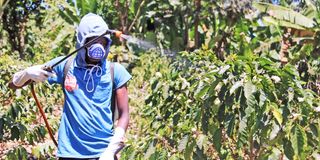Breaking News: At least 10 feared to have drowned in Makueni river
Why Kenyan coffee risks losing its global appeal

A man sprays coffee plants. Kenya risks losing its top spot in the world coffee market following its rejection in Japan and South Korea due to high levels of chemical contamination.
What you need to know:
- South Korea and Japan say chemicals exceed acceptable levels
- Kenya Coffee Producers Association wants the government to address the issue.
- Statistics for 2017/2018 show that South Korea accounted for 12 percent of Kenya’s coffee exports, fourth after Germany, United States and Belgium.
- Kenyan coffee production has been declining from a high of 130,000 tonnes realised in the late 80s to the current 40,000 tonnes.
Kenya’s coffee risks losing its top spot in the world market following its rejection in Japan and South Korea due to high levels of chemical contamination.
The chemical levels of Ochratoxin have exceeded the allowable minimum, resulting in rejection at the two countries’ border points.
The coffee, which is highly sought after by roasters for blending with lower quality beans from other parts of the world, has been banned for three years with local stakeholders now raising concerns that if this is not reversed, then the produce could face total ban.
Kenya Coffee Producers Association wants the government to address the issue, arguing that it could have a negative effect on other importing countries as well.
“The flagging of Kenyan coffee by the key markets due to high levels of contamination does not augur well for the sector. The government has to move fast in addressing this challenge,” said Peter Gikonyo, the association’s chairperson.
World coffee prices
Statistics for 2017/2018 show that South Korea accounted for 12 percent of Kenya’s coffee exports, fourth after Germany, United States and Belgium.
Mr Gikonyo said some of the reasons for the flagging could be gaps in certification procedures for coffee agrochemicals, inadequate capacity by farmers in post-harvest handling of the crop and gaps in coffee export regulations and enforcement.
The producers also raised concern over the measures put in place by the government to curb the spread of Covid-19 arguing that it has affected production of the commodity.
“The measures have increased cost of production, compromised quality, reduced demand of coffee and increased cost of logistics,” said Mr Gikonyo.
He said the pandemic has made worse an already bad situation given that world coffee prices were already down at the beginning of the year before Covid- 19.
Fall in production
Kenyan coffee production has been declining from a high of 130,000 tonnes realised in the late 80s to the current 40,000 tonnes.
Majority of the smallholder coffee farmers are currently producing less than two kilogrammes (kg) per tree per year against an annual potential of 35kg per tree.
The fall in production is blamed on poor management of farmer cooperatives and infiltration of the sector by cartels that has seen growers’ earnings fall every other year.
To revive the sector, the government in February announced that coffee trading will be regulated by the Capital Markets Authority in a move aimed at taming cartels blamed for diminishing earnings by farmers.
The government also enacted the cherry fund to ensure that farmers meet their financial obligations after harvesting as well as effectively support other production activities such as pruning and application of agrochemicals.
Previously, farmers had to wait for months after harvesting to receive payments which would expose them to high interest loans of as much as 20 percent interest rate from Saccos.





